Welcome, fellow cat enthusiasts! Today, this pet food expert will unveil the essential details of ‘How Much Should An Adult Cat Eat?’ Ensuring our feline companions receive the right amount of nourishment is crucial for their well-being.
Maintaining your adult cat’s health, energy levels, and general well-being requires feeding them the proper amount of food.
Yet with so many various food options and feeding schedules, figuring out how much to feed your cat can be difficult.
Generally, how much should an adult cat eat daily depends on weight and age. An adult cat of typical size has to ingest 24-35 calories per pound of body weight per day.
In this post, I’ll delve into the factors influencing their dietary needs and provide practical guidelines to keep your cat happy and healthy.
Let’s embark on this insightful journey together!

Table of Contents
How Much Should an Adult Cat Eat Per Day?
Your adult cat’s daily food intake depends on several factors, such as weight, activity level, and overall health.
As a general guideline, this pet food expert recommends feeding an average-sized adult cat (around 8-10 pounds) approximately 240-280 calories per day.
Some cats prefer several small meals throughout the day, while others are content with two larger servings. Find a routine that suits your cat’s preferences and schedule.
However, individual needs may vary, so you must consult your veterinarian to determine the precise amount of food your cat requires.
Remember to provide a balanced diet with high-quality cat food to ensure they receive all the essential nutrients for a happy and healthy life.
Why Is It Important To Feed My Cat Properly?
For your cat to be healthy and happy overall, you must feed it properly. A balanced diet can help your cat maintain a healthy weight, lower their chance of contracting some illnesses, and support immune and digestive health.
Here are some reasons why it’s important to feed your cat properly:
1. Maintaining a Healthy Weight:
Overfeeding your cat can lead to obesity, which can cause a range of health problems, including diabetes, joint issues, and heart disease.
Feeding your cat the right amount of food can help them maintain a healthy weight and reduce their risk of developing these health conditions.
2. Supporting Their Immune System:
Proper nutrition is essential for supporting your cat’s immune system. A diet that is rich in nutrients and antioxidants can help your cat’s body fight off infections and diseases.
3. Preventing Nutritional Deficiencies:
Feeding your cat a balanced and complete diet is essential for preventing nutritional deficiencies. Nutritional deficiencies can lead to various health problems, including skin, dental, and digestive issues.
4. Promoting Healthy Digestion:
A proper diet can promote healthy digestion in your cat. Feeding your cat high-quality food that is easy to digest can help prevent gastrointestinal issues such as vomiting and diarrhea.
5. Improving Overall Quality of Life:
Proper nutrition can improve your cat’s overall quality of life. Feeding your cat the right amount of food, with the right balance of nutrients, can help them maintain a healthy weight, prevent health problems, and live a long and happy life.
Feeding your cat properly is crucial for its health and well-being. By providing your cat with a balanced and nutritious diet, you can help them stay healthy and happy.
What Kind Of Food Should I Feed My Cat?
It’s best to feed them nutritionally balanced and complete commercial cat food that meets the standards set by the Association of American Feed Control Officials.
Wet or canned food is also recommended as it can help prevent dehydration and promote urinary tract health. Here are some things to consider when selecting food for your cat:
1. Nutritional Content: Look for cat food that is nutritionally complete and balanced, containing all of the essential nutrients your cat needs. The food should be rich in protein, vitamins, and minerals.
2. Choose High-Quality Cat Food: Look for cat food made from high-quality ingredients, with real meat as the first ingredient. Avoid cat food that contains fillers or artificial preservatives.
3. Wet vs. Dry: Wet food can help keep your cat hydrated, while dry food can help keep their teeth clean. Many veterinarians recommend feeding wet and dry food to provide your cat with both benefits.
4. Age and Health: Different types of cat food are formulated for cats of different ages and health conditions. For example, kittens need a different kind of food than adult cats, and cats who have certain medical disorders, such as kidney illness, may need a particular diet.
5. Ingredients: Look for cat food that contains high-quality ingredients, such as whole meats and vegetables. Avoid foods that contain by-products, fillers, or artificial preservatives.
6. Brand Reputation: Choose a cat food brand with a good reputation for quality and safety. Look for brands certified by (AAFCO).
Your veterinarian can provide recommendations based on your cat’s age and health. So always consult your vet.
Essential Nutrition Tips For A Thriving Feline Friend
Feeding your cat a healthy and balanced diet is essential for their health and well-being.
Here are some essential nutrition tips to help ensure that your feline friend is thriving:
✔ Choose High-Quality Cat Food: Look for cat food that contains high-quality ingredients, with real meat as the first ingredient. Avoid cat food that contains fillers or artificial preservatives.
✔ Ensure Adequate Protein Intake: Protein is essential for cats, and they require a higher amount of protein in their diet than many other animals. Choose cat food that contains at least 30% protein.
✔ Avoid Feeding Table Scraps: Table scraps and human food may contain ingredients harmful to cats, such as onions, garlic, and chocolate. Stick to feeding your cat balanced and complete cat food.
✔ Provide Plenty of Water: Cats always need access to fresh water. Consider providing a water fountain or multiple bowls to encourage your cat to drink more.
✔ Monitor Portion Sizes: Overfeeding your cat can lead to obesity, which can cause health problems. Please consult your veterinarian to determine the appropriate portion size for your cat based on age, weight, and activity level.
✔ Consider Your Cat’s Age and Health: Cats have different nutritional needs at different stages of life. Kittens require more calories and protein than adult cats, while seniors may require a lower-calorie diet to prevent obesity. Consult your veterinarian for advice on the best food to feed your cat if they suffer from a medical condition like diabetes or kidney disease.
✔ Treats in Moderation: Treats can be a great way to reward your cat, but they should be given in moderation. Too many treats can lead to weight gain and health problems.
Providing your cat with a balanced and nutritious diet is essential for health and well-being. Following these essential nutrition tips can help ensure your feline friend thrives and lives long and healthy.
How Much Wet And Dry Food To Feed A Cat?
The amount of wet and dry food to feed a cat depends on several factors, including age, weight, and activity level.
As a general guideline, the average adult cat needs about 1/2 to 2/3 cups of dry food per day, divided into two meals. The average adult cat needs about 3-5 ounces per day for wet food, divided into two meals.
It’s important to note that these are general guidelines and the exact amount of food your cat needs may vary based on their needs.
Factors such as age, weight, activity level, and overall health can all affect how much food your cat needs.
For example, a young, active cat may need more food than an older, less active cat. It’s also important to consider the calorie content of the food you’re feeding your cat.
High-calorie foods may require smaller portions, while low-calorie foods may require larger portions to provide your cat with the necessary nutrients and energy.
Consulting with your veterinarian is the best way to determine the appropriate amount of food to feed your cat based on its needs.
Your veterinarian can also guide the type of food best for your cat’s age, weight, and health status.
Feeding Chart for Cats (by Weight)
| Weight (lbs) | Daily Calories | Cups of Food (oz) | Wet Food (oz) |
|---|---|---|---|
| 20 | 500 | 8 | 12 |
| 15 | 375 | 6 | 9 |
| 10 | 250 | 4 | 6 |
| 5 | 125 | 2 | 3 |
| 1 | 25 | 0.5 | 0.6 |
FAQs
Hopefully, I have answered all of your questions regarding senior cat eating. You can still have other questions about how much an adult cat should eat. So below, I answered some Frequently asked questions.
How much should an 8 month old cat eat?
An 8 month old cat should eat around 3-4 small meals per day, consisting of approximately 1/4 to 1/3 cup of dry or wet food per meal, depending on the cat’s size, activity level, and individual needs.
How much should a 9 pound cat eat?
The amount of food a 9-pound cat should eat can vary depending on age, activity level, and individual needs. As a general guideline, a 9-pound adult cat typically needs around 200-250 calories daily to maintain weight. This translates to approximately 1/2 to 2/3 cups of dry cat food or 4-6 ounces of wet cat food per day, split into two or three small meals.
How much should 6 month old cat eat?
As a rough guide, a 6-month-old kitten that weighs around 4-6 pounds may need to eat around 1/2 to 3/4 cup of kitten food per day, divided into several small meals.
How often should I feed my adult cat?
Feed your adult cat 2-3 meals daily, depending on their needs and activity level.
How Often Should You Feed a Kitten?
A kitten should be fed small, frequent meals throughout the day, ideally 3-4 times per day. Providing a high-quality, age-appropriate diet supports their growth and development.
Is it safe to give my cat raw meat?
Raw meat can pose health risks to cats, including bacterial infections, so it’s best to avoid it.
How Often Should You Feed an Adult Cat?
Depending on their needs and preferences, adult cats should be fed twice daily.
How Often Should You Feed a Senior Cat?
A senior cat, typically over 7-8 years of age, may have different feeding needs than an adult cat. They may be less active and have a slower metabolism, which can lead to weight gain if they are overfed. Feeding senior cats 2-3 small meals per day, rather than one or two larger meals, is generally recommended to help maintain their energy levels and prevent digestive issues.
Final Thoughts
How Much Should an Adult Cat Eat? Maintaining your adult cat’s health and well-being depends on feeding them a premium, nutritionally complete diet that satisfies their needs.
While the amount of food an adult cat requires varies depending on their weight, activity level, and health status, 1-2 meals per day is generally recommended.
To maintain a healthy weight, you should monitor your cat’s body condition and adjust its feeding schedule and amount.
Consult your veterinarian for specific feeding instructions and to address any concerns you have about your cat’s diet or health. You can help your cat live a long and healthy life by providing proper nutrition and care.

Hi there! My name is Koushik; I am a cat lover. I specialize in writing about pet care & food. I have a wealth of knowledge on cat food niches and related subjects. I have worked in the pet industry for over 5 years and am passionate about helping cat owners provide the best care for their furry friends. With knowledge of cat food and nutrition, I aim to share their insights and help cat owners navigate the world of cat food niches. I enjoy playing with my two cats, reading, and exploring new cat food brands in my free time.
